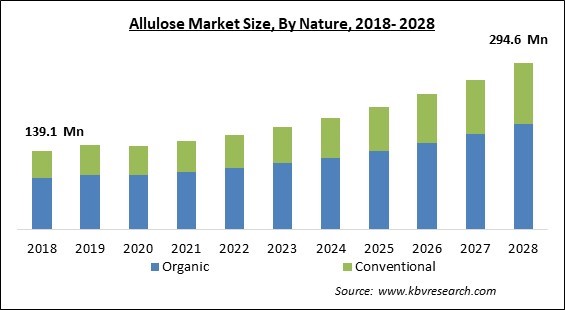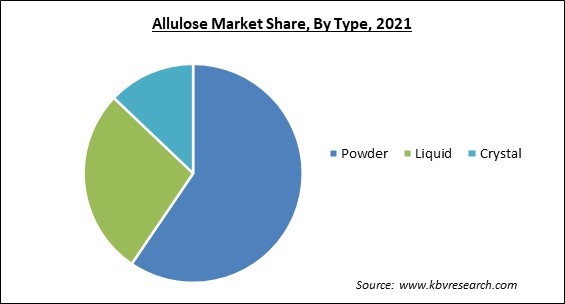The Global Allulose Market size is expected to reach $294.6 million by 2028, rising at a market growth of 9.9% CAGR during the forecast period.
A variety of products include trace levels of allulose. When compared to sucrose, allulose has a 70% sweeter taste. Reduced insulin resistance, improved hypoglycemia control, as well as antioxidant enhancement, and production in the human body are all benefits of allulose. Allulose is morphologically similar to sugar and has a similar taste, texture, and appearance. It is, however, calorie-free. Urban consumers concerned about their health are increasingly turning to allulose. Allulose is often used by food makers to add bulk and texture to their products, as well as to work in conjunction with other sweeteners.

It also has a low glycemic index, meaning it doesn't elevate blood sugar levels after eating, making it a popular choice among diabetics, leading to considerable market growth. Allulose is used in pharmaceuticals as a gelling agent in medicines and drugs, savory meals such as soups, sauces, sauerkraut, toppings, pickles, salads, and beverages, such as health drinks, soft drinks, and others.
Because allulose is a monosaccharide (a single sugar molecule), it does not require digestion after consumption. Allulose, on the other hand, is promptly absorbed by the body and excreted in it entirely. The small intestine absorbs about 70% of the allulose humans eat, and it eventually passes through the body via urine, typically within 24 hours. After passing via the large intestine, the remaining 30% departs the body within 48 hours. Allulose does not raise blood glucose or insulin levels because of the way bodies process it.
Allulose has gained popularity among those who follow a ketogenic diet, which limits sugar and carbohydrate intake so that the body may start producing and utilizing ketone bodies as an alternative energy source. Allulose is a low-calorie sugar that tastes like sugar and has the same clean, sweet flavor. It can be found in a variety of foods and beverages to help people live a healthier lifestyle. Allulose was first discovered in wheat and has since been discovered in a variety of fruits, including jackfruit, figs, and raisins. Small amounts of allulose can be found in a number of sweet foods, such as caramel sauce, maple syrup, and brown sugar.
Allulose, a natural sweetener, is becoming more popular as a healthier alternative to white processed sugar. Fear of contracting COVID-19 has spurred the short-term expansion, forcing a reduction in all non-healthy food intake, which compromises one's immunity. Due to all these concerns, the allulose market witnessed a spike in growth during the pandemic. However, COVID-19 hampered different industrial activities and disrupted the supply chain, affecting practically all industries. Due to a lack of workers, most businesses were shut down. Due to this, the production of allulose was hauled. As a result, the growth of the market was gradually disrupted.
The calorie content of allulose in contrast to sugar is one of the most significant distinctions between both the products. In fact, allulose has only 0.4 calories per gram, which is approximately 90% less than sugar. Reduced caloric intake is a simple strategy to accelerate weight loss. Switching allulose with table sugar can help a consumer in decreasing calories and lose weight when combined with regular exercise along with a healthy and well-balanced diet. Allulose, in addition to aiding weight loss, appears to have the potential to improve fat loss, according to various research and studies. Moreover, allulose comprises a number of beneficial nutrients, which are considered helpful in losing weight.
Allulose can be an effective solution for improving blood sugar control. Not only does allulose have a low glycemic index, which means it has no negative effect on blood sugar levels, but it may also preserve the beta cells in the pancreas, which produce insulin. Eating allulose with a meal can result in significant blood sugar reductions within 30-60 minutes. Additionally, it can also help in lowering insulin levels, improving the body's ability to carry sugar from the bloodstream to the cells more effectively. Along with it, consumption of allulose can also help in improving liver health. It can help in preventing fatty liver disease, a dangerous condition that can eventually lead to cirrhosis or liver scarring.

One of the major stumbling blocks in the growth of the allulose market is the increasing number of products being introduced in the market with the capability to substitute allulose. Allulose is a sugar that occurs naturally in a variety of foods. Allulose can be replaced with a variety of sugar substitutes, including stevia aspartame, sucralose, saccharine, and neotame. These sugar substitutes, with the exception of stevia, are not natural. Sucralose is made from sucrose or table sugar, whereas aspartame and neotame are made by combining two amino acids, or protein building blocks present naturally in the human body. These sweeteners have been approved for use in humans by the FDA and are rated as generally recognized as safe. Instead of sugar, these low and also no-calorie sweeteners are used by many beverage, dietary food, medication, mouthwash, and cosmetic producers.
Based on Nature, the market is segmented into Conventional and Organic. In 2021, the conventional segment acquired the significant revenue share of the allulose market. The increasing growth of the segment is owing to the increased availability of this type of allulose. Pesticides and fertilizers are regularly sprayed on conventional sources of allulose. The segment's rise is being fueled by the increased use of conventional allulose as an important ingredient in food and beverages.
Based on Type, the market is segmented into Powder, Liquid, and Crystal. In 2021, the liquid segment recorded a significant revenue share of the allulose market. The surging growth of the segment is owing to the increasing use of this type of allulose in bakeries across the world. Baked items, frozen sweets, as well as various types of drinks can be made using liquid allulose. The rapidly increasing number of bakeries all over the world is one of the major factors that is driving the demand for liquid allulose.
Based on Application, the market is segmented into Bakery & Confectionery, Food, Dairy & Frozen Desserts, Sauces & Dressings, Beverages, and Others. In 2021, the bakery & confectionery segment procured the largest revenue share of the allulose market. The growth of this segment is significantly rising due to attributes, such as higher moisture content, improved water retention rate, and softness when utilized.
| Report Attribute | Details |
|---|---|
| Market size value in 2021 | USD 155.4 Million |
| Market size forecast in 2028 | USD 294.6 Million |
| Base Year | 2021 |
| Historical Period | 2018 to 2020 |
| Forecast Period | 2022 to 2028 |
| Revenue Growth Rate | CAGR of 9.9% from 2022 to 2028 |
| Number of Pages | 159 |
| Number of Tables | 374 |
| Report coverage | Market Trends, Revenue Estimation and Forecast, Segmentation Analysis, Regional and Country Breakdown, Companies Strategic Developments, Company Profiling |
| Segments covered | Nature, Type, Application, Region |
| Country scope | US, Mexico, China, Japan, India, South Korea, Singapore, Malaysia, Brazil, Argentina, UAE, Saudi Arabia, South Africa, Nigeria |
| Growth Drivers |
|
| Restraints |
|
Based on Regions, the market is segmented into North America, Europe, Asia Pacific, and Latin America, Middle East & Africa. In 2021, Asia-Pacific accounted for the significant revenue share of the allulose market. This is due to a number of variables, including the region's largest material production as well as a vast consumer base. India is one of the world's biggest producers of wheat, and wheat produces allulose. It is one of South Asia's most major producers and consumers of allulose.
Free Valuable Insights: Global Allulose Market size to reach USD 294.6 Million by 2028
The market research report covers the analysis of key stake holders of the market. Key companies profiled in the report include Ingredion, Incorporated, Tate & Lyle PLC, Johnson & Johnson (McNeil Nutritionals, LLC), CJ CheilJedang Corporation, Cargill Corporation, Quest Nutrition LLC (Atkins Nutritionals Holdings, Inc.), Anderson Global Group, LLC, Apura Ingredients, Inc., Matsutani Chemical Industry Co., Ltd., and Bonumose, Inc.
By Nature
By Type
By Application
By Geography
The global allulose market size is expected to reach $294.6 million by 2028.
Aids in weight management and fat loss are driving the market in coming years, however, Availability of substitutes limited growth of the market.
Ingredion, Incorporated, Tate & Lyle PLC, Johnson & Johnson (McNeil Nutritionals, LLC), CJ CheilJedang Corporation, Cargill Corporation, Quest Nutrition LLC (Atkins Nutritionals Holdings, Inc.), Anderson Global Group, LLC, Apura Ingredients, Inc., Matsutani Chemical Industry Co., Ltd., and Bonumose, Inc.
The expected CAGR of the allulose market is 9.9% from 2022 to 2028.
The Powder segment is leading the Global Allulose Market by Type in 2021, thereby, achieving a market value of $201.06 million by 2028.
The Asia Pacific market dominated the Global Allulose Market by Region in 2021, and would continue to be a dominant market till 2028; thereby, achieving a market value of $118.03 Million by 2028.
Our team of dedicated experts can provide you with attractive expansion opportunities for your business.

